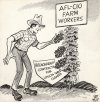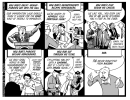Your argument about women in the military is just like your systemic racism argument. There are more women in the service, and in senior leadership positions, than at any point in history. And their numbers keep growing. Ask yourself why that is . . . .
GAO: Women 28 Percent More Likely to Leave Military Service than Men - USNI News
Family planning, child care, sexism and sexual assault were among the top reasons female service members are more likely than men to leave the military.news.usni.org
The report lists several reasons as contributing to why women leave the service earlier in their careers. Women from all branches stated family concerns were a top reason to leave early in their careers. For the Navy, the report states the rigidity and timing of some job requirements do not match up well with starting a family.
“Naval surface warfare tours—often occur at the time in a female active-duty servicemember’s life when she may try to become pregnant or have young children,” the report states.
Repeatedly, females leaving the service stated there were few senior female enlisted and officer personnel to serve as mentors.
With fewer females in leadership roles, the report states women frequently stated the military was led by men who were not supportive of or understand family needs. The military was an organization where “they often faced sexism and the existence of an ‘old boy’s network,’ especially in career fields dominated by males.”
-
Please take a moment and update your account profile. If you have an updated account profile with basic information on why you are on Air Warriors it will help other people respond to your posts. How do you update your profile you ask?
Go here:
Edit Account Details and Profile
You are using an out of date browser. It may not display this or other websites correctly.
You should upgrade or use an alternative browser.
You should upgrade or use an alternative browser.
CJCS responds to Rep. Gaetz
- Thread starter IKE
- Start date
nodropinufaka
Well-Known Member
Just because thing have been improving doesn't mean there are not any issues. The report I posted shows a 15 year trend from 2004-2019.Your argument about women in the military is just like your systemic racism argument. There are more women in the service, and in senior leadership positions, than at any point in history. And their numbers keep growing. Ask yourself why that is . . . .
Its not like one policy changes and all previous problems are wiped away right away.
You're right: functionally, not different. However, my point was, I doubt they were crafted with racist intentions, although I concede it's possible; it's not an unreasonable thought 20-30 years ago to say "let's make tougher punishments for drugs to disincentivize use and distribution." We have since learned of what the outcomes are and I am glad we fixed them going forward. I support what President Obama (and maybe Trump, I cant recall?) were doing with commuting the sentences of non-violent drug convictions that would be different under today's laws, although it probably needs to be done on a larger scale.
The image won't load directly, but click on this link for an interesting (and saddening) chart. I can't answer the question of whether "war on drugs" policies were designed to target some races more than others, but the facts seem to bear out that blacks are more likely to be arrested for drug use and more likely to be jailed for drug use than whites.
Could that be because blacks were more like to commit another infraction that put them in contact with the police while in possession of drugs?The image won't load directly, but click on this link for an interesting (and saddening) chart. I can't answer the question of whether "war on drugs" policies were designed to target some races more than others, but the facts seem to bear out that blacks are more likely to be arrested for drug use and more likely to be jailed for drug use than whites.
Blacks make up 17.4% of the population but commit a disproportionately higher percentage of crime. Because of this there are a higher percentage of blacks in jail.
Estimated number of arrest by offense and race, 2019. Age: all ages
I don't know if a specific statistic for that case (e.g. unrelated infraction leads to drug arrest) but I'll take a look. However, Whren vs United States made it pretty clear that police can pull over drivers for virtually anything and then springboard from there to drug arrests.Could that be because blacks were more like to commit another infraction that put them in contact with the police while in possession of drugs?
Blacks make up 17.4% of the population but commit a disproportionately higher percentage of crime. Because of this there are a higher percentage of blacks in jail.
Estimated number of arrest by offense and race, 2019. Age: all ages
nodropinufaka
Well-Known Member
SELRES_AMDO
Well-Known Member
King of the Hill was ahead of its time.
RoarkJr.
Well-Known Member
Just started watching again the other day. Underrated.King of the Hill was ahead of its time.
What if the intent, when crafted, was the other way? There's a new wonder drug hitting the streets and it's probably going to hit blighted areas harder than affluent ones. Instead of doing nothing and letting it destroy communities, what about harsher sentences?
(Of course, your philosophy on crime and punishment and drugs might be that prohibition is a fool's errand, and the money and effort better spent on other anti-drug strategies.)
I mean, to be fair, I was a kid back then and not really in tune with the social issues of the day, though, I suspect I would have had no problem with it initially if we were concerned with whatever drug we thought were ravaging our society.
I think we've learned a lot about drugs though: going after the users is a fools' errand and a money pit, addiction is real, and harher sentences don't really enter into the calculus of a typical abuser. The rest, I understand is up for debate: do we or do we not go after dealers and supply chains, do we legalize, regulate, and tax, do we allow employers to continue to ban their use while not prosecuting the use of the drugs themselves until they cause harm in another way (DUI, etc.) as a secondary offense style charge, and then let those people effectively rot away in society as they can't find gainful employement (in reality, is this much different than those who haven't been prosecuted and jailed already?)? My mind is open to different solutions, but I realize that the ones implemented in the 80s and 90s probably didn't yield the desired effects.
nodropinufaka
Well-Known Member
I mean, to be fair, I was a kid back then and not really in tune with the social issues of the day, though, I suspect I would have had no problem with it initially if we were concerned with whatever drug we thought were ravaging our society.
I think we've learned a lot about drugs though: going after the users is a fools' errand and a money pit, addiction is real, and harher sentences don't really enter into the calculus of a typical abuser. The rest, I understand is up for debate: do we or do we not go after dealers and supply chains, do we legalize, regulate, and tax, do we allow employers to continue to ban their use while not prosecuting the use of the drugs themselves until they cause harm in another way (DUI, etc.) as a secondary offense style charge, and then let those people effectively rot away in society as they can't find gainful employement (in reality, is this much different than those who haven't been prosecuted and jailed already?)? My mind is open to different solutions, but I realize that the ones implemented in the 80s and 90s probably didn't yield the desired effects.
Our own government was giving funds that were authorized Department of State HA/DR funds to the Nicaraguan Contras during this time. Who were trafficking drugs and arms.
So Reagans war on drugs wasn't really a war on drugs. Not when he is punishing a bunch of people in the states and then handing money to drug dealers outside the country.
The image won't load directly, but click on this link for an interesting (and saddening) chart. I can't answer the question of whether "war on drugs" policies were designed to target some races more than others, but the facts seem to bear out that blacks are more likely to be arrested for drug use and more likely to be jailed for drug use than whites.
While interesting, that needs a lot more context. I'd like to see the citation what shows just how similar usage rates are (and compare the usage rates of various types of drugs vs. the convictions and incarcerations broken down by race) and how many drug related arrests were attached with violent acts or misuse of a vehicle or similar vice just use. I also want to know for sure that the incarcerated rates are of those who are arrested with a drug charge. Ultimately: there's a lot missing from that piece, albeit interesting as it is.
I am guessing we are measuring this disproportionate affect by the outcome. That being the case, no is your answer. It may be racism, but in nearly all cases it is not. Disparate outcome by race is no more an indicator of any single affect then any other correlation problem. Humans react differently to various incentives and disincentives. There are many obvious examples. My go to on this subject is Thomas Sowell.Serious question:
if a policy disproportionately affects minorities whether by design or not. Is it racist?
I think it is. But if im wrong I’ll admit im wrong.
I don't know if a specific statistic for that case (e.g. unrelated infraction leads to drug arrest) but I'll take a look. However, Whren vs United States made it pretty clear that police can pull over drivers for virtually anything and then springboard from there to drug arrests.
A) don't be driving around with illegal drugs in your car.
B) Joe Biden wrote the 1994 crime bill that is the closest thing to "systemic racism" in modern America and established a lot of the unfair sentencing for such arrests so it's not like the left is any friend of Black America.
SELRES_AMDO
Well-Known Member
"First, ship 'em dope and let 'em deal the brothers
Give 'em guns, step back, watch 'em kill each other
It's time to fight back, that's what Huey said
Two shots in the dark, now Huey's dead"
Give 'em guns, step back, watch 'em kill each other
It's time to fight back, that's what Huey said
Two shots in the dark, now Huey's dead"





